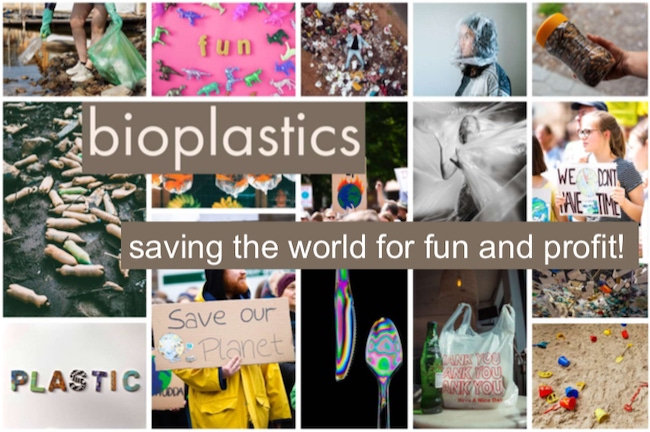A program developed by Engineering Training Services Inc. (Bloomfield Hills, MI) that is being offered at Michigan State University promises to “empower engineers with the knowledge necessary to create environmentally friendly, sustainable and futuristic products that customers will love.”
October 5, 2019

The headline is intriguing: “Bioplastics—Saving the World for Fun and Profit!” It announced a program developed by Engineering Training Services Inc. (ETS; Bloomfield Hills, MI), an advanced plastics consulting firm, that is being offered at Michigan State University. The program promises to “empower engineers with the knowledge necessary to create environmentally friendly, sustainable and futuristic products that customers will love.”
The course description predictably begins with a doomsday scenario of humanity “quickly approaching a crossroads the likes of which we have never seen before.” And, of course, the plastic waste “crisis” is at the root of this apocalypse—the “unexpected byproduct of the industrial revolution” is spreading plastics everywhere, including the “thousands of microplastics particles in your body right now.”
ETS said it is futile to clean up the ocean before “addressing the source of the problem,” which is, of course, plastics. The plastic pollution “crisis” is being laid directly at the feet of the plastics industry. The people who put discarded plastic products into the environment are in no way responsible.
The answer, according to ETS, is—drum roll, please—bioplastics! This training course offers a history of bioplastics, microplastics and the state of the environment as well as an overview of the types of materials that can be used to make bioplastics, such as hemp, starch, bamboo, algae and—my personal favorite—spider silk. Sustainability is a big topic in this training course, which defines bio-based, biodegradable and compostable materials and explains “how biodegradable and compostable are not interchangeable and what that means.”
I’ll tell you what that means. It means that biodegradable materials are not necessarily compostable. It means that biodegradable plastics are meant to degrade if left out in the open environment over a period of several years. Bioplastics currently are not recyclable. The best disposal method is landfilling, as I’ve been told by a number of people in the bioplastics business. So why spend time and money making something that is supposed to be put into the environment?
Compostability is another story. I see that word on so many take-out containers made from various bio-based plastics and paperboard. But what does that word mean when there is no infrastructure to collect these so-called “compostable” containers curbside or special bins in public places where people can dispose of them? Even if they could be collected, where would they be sent for composting? Most of the composting facilities I’ve spoken with take only yard and food waste.
“Biodegradable” and “compostable” are feel-good words that have no basis in reality for solving the plastic waste problem. If anything, bioplastics and so-called “compostable” plastics add to the myth and to the problem—they don’t contribute much to a solution.
Maybe ETS should invite MSU’s professor of plastics engineering Ramani Narayan to speak “truth” to the training class. “Why is replacing petro-carbon with bio-carbon better? Carbon is carbon. There is organic carbon and inorganic carbon. It takes 10 years to turn an inorganic carbon into an organic carbon through biodegradability. Recycling and waste to energy are the best use of plastics—give up the biodegradability myth.”
I agree! Biodegradable plastics won’t save the world!
About the Author(s)
You May Also Like




